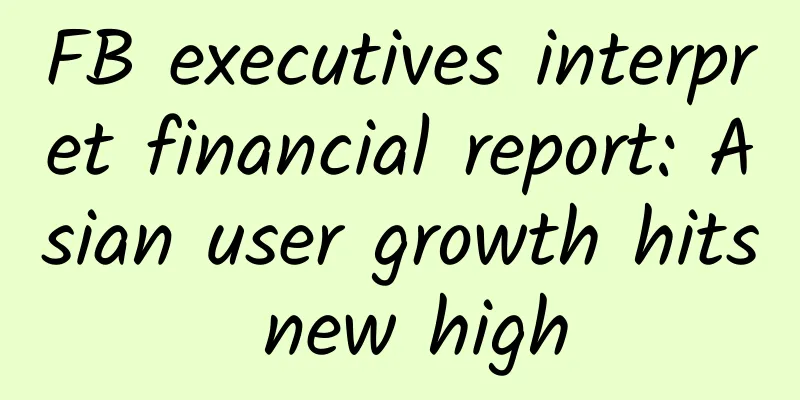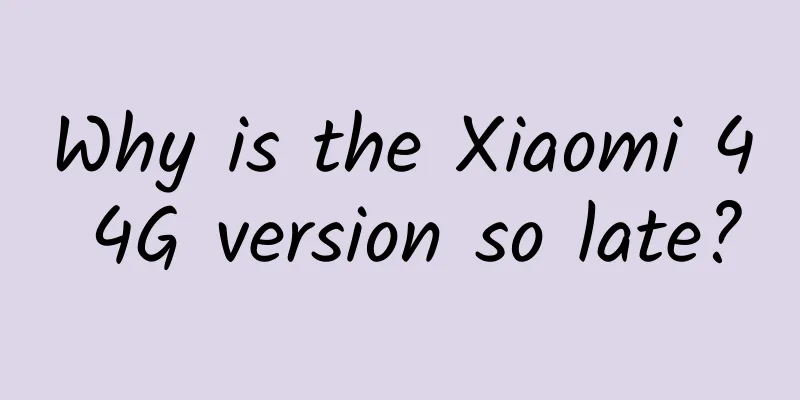FB executives interpret financial report: Asian user growth hits new high

|
Facebook today released its unaudited financial report for the fourth quarter and full year of fiscal year 2016 ending December 31. The report shows that Facebook's fourth quarter revenue was $8.809 billion, up 51% from $5.841 billion in the same period last year; net profit was $3.568 billion, up 128% from $1.562 billion in the same period last year. Excluding the amortization of intangible assets, equity incentive expenses and their related payroll tax expenses and income tax adjustments (not in accordance with US generally accepted accounting principles), Facebook's fourth quarter net profit was $4.150 billion, much higher than $2.265 billion in the same period last year. After the financial report was released, Facebook CEO Mark Zuckerberg, COO Sheryl Sandberg and CFO Dave Wehner participated in the subsequent analyst conference call to interpret the key points of the financial report and answer questions from analysts. The following is the main content of the analyst question and answer session: JP Morgan analyst: You have been emphasizing the video-first strategy in the past one or two quarters. Can you tell us how you view the strategic importance of long video content? What do you think about distributing these video contents through platforms such as Facebook mobile apps or other platforms? Zuckerberg: Our focus in the initial stage is more on short videos. We now think that short video content will have different components, such as videos made by people to socialize with friends, videos made by companies and celebrities for publicity, but there will also be a lot of high-quality videos. Producers need to be able to make money to continue creating these contents. Therefore, we need a business model to support the development of this part of the content. At present, we are financially supporting it through the advertising business model. I think in the next one or two years, as this business model develops, everyone will see more video inventory and video content in the information flow and "circles" (tab). In the long run, I think as this model becomes more successful, people will start experimenting with long videos and other different types of content, and I think this will be our focus for the foreseeable future. Weiner: You just asked about the distribution platform. Yes, we have been working hard to bring the company's services to various platforms, but obviously, the focus is still on mobile platforms. Morgan Stanley analyst: Now that Instagram has 400 million daily active users, I'm curious about how you think about the core use of Instagram? How is its positioning different from Facebook's core use? How has the differentiation evolved over time? How has Instagram's monetization evolved over time? Second, regarding content, you mentioned that investment in content is part of the company's investment. So, is your investment in content more about sharing revenue with partners? Will you go out and find more partners to obtain content authorization? Weiner: Let me answer the latter question first. The company's goal is to build an ecosystem around partner content in the video field. For example, our business model is to share revenue with partners. Now, in order to make this ecosystem work, we are now providing financial support for these early seed content, but the focus is still on the revenue sharing model. Zuckerberg: Regarding the first question, I think there are several major differences in the core usage of Facebook and Instagram. For example, from the perspective of the community relationship map, Instagram is a "follow" model rather than a mutual and equal friendship relationship. A large part of Instagram's content is public content, and more visual content. Facebook is a mixed model of text, news, links, pictures, and videos, while the Instagram experience is purely pictures or videos. So Kevin (Kevin Systrom, founder and CEO of Instagram) has made many small but correct choices over the years, which have accumulated to create a community that is different from Facebook but complementary to it. And we found that as we encouraged people to use both Instagram and Facebook, they actually became more active on both platforms, and I think that building different communities and connecting people in different ways is a way to add new value to people's lives. UBS analyst: What opportunities and challenges do you encounter in terms of monetization of video content? Sandberg: We are now seeing an explosion in consumer video content on the company's platform, which provides great opportunities for video advertising in the news feed. Users like to post video content and also like to consume video content and stories they see in the news feed. These contents include both video stories that users want to tell and opportunities for us to add advertising. As consumer video content in the news feed increases, we can increase ads that align with what consumers are doing, and we're seeing a lot of ads in people's Facebook news feed as well as their Instagram news feed. As for some of our latest advertising monetization forms in the information flow, such as Ad Break, these are still in the experimental stage. At present, our focus is still on core business and core advertising products, video being one of them. I think one of the most important things is to help enterprise marketers understand that they need to optimize video ads. A 30-second ad that performs differently on other platforms or traditional media platforms may also perform well on our platform, but by optimizing these ads and using our precision targeting technology, the performance of these ads can be even better. We are working hard to help enterprise marketers realize this. For example, Motorola partnered with Ogilvy to launch the Moto Z phone. Before the phone was launched, they promoted it to Android phone users and Verizon users, and they optimized the ads for the mobile news feeds of Facebook and Instagram. Then after the phone was launched, they advertised to the audience who had previously viewed the ads. This is a good example of a company using our platform, optimizing video ads, and using our unique precision targeting technology to increase product sales. According to their tracking results, Facebook and Instagram video ads helped them increase sales by 3.5%. Therefore, we are very excited about the opportunities in our existing business. Next, we will work with all advertisers to optimize video ads, and then do the best and deepest precision targeting, and ensure that sales can be well tracked throughout the entire advertising process. Bank of America Merrill Lynch analyst: First, obviously there was a lot of political activity in the fourth quarter, so did this have an abnormal impact on Facebook's revenue or users? Second, what is the difference between the millennial generation on Facebook and other user groups? What is the change in this trend? Finally, we noticed that some of your markets have begun to test some ads for Messenger, so can you introduce the test situation? Sandberg: When it comes to presidential elections, our business is very large and diversified, so there are always many large events such as the US presidential election, the World Cup , the Super Bowl, etc., and there are so many such large events in the world that it is difficult for any single event to have a significant impact on our business. Even in the last quarter, the political-related advertising revenue in the United States alone did not even rank among our top ten advertising verticals. In terms of Messenger advertising, our current focus is still on promoting user growth and user activity, because we know that only in this way, as time goes by, monetization opportunities will always follow. Now we see a lot of natural connections between businesses and consumers. Now there are more than 1 billion messages between businesses and consumers on Messenger every month. I think this development trend is a good momentum for the company's future monetization opportunities. Messenger advertising is still in its early stages. Some of the ads you see now are mainly exploring more ways to connect businesses and users. At present, our focus is still on user experience. Weiner: Regarding the US election, I would like to add that the daily active user and monthly active user figures we announced in December showed that there was no increase in our users during the US presidential election. We are very pleased with the millennial users, as this is the quarter with the highest absolute year-on-year growth in daily and monthly active users since we went public, but we will not disclose the specific situation of each user group. Overall, Facebook and Instagram are still very important platforms for advertisers who want to influence millennials. Royal Bank of Canada analyst: The monthly active user number in Asia has increased by about 44 million month-on-month, which is also the highest in Facebook's history. So, can you tell us which countries or markets in Asia have contributed the most to the growth? Secondly, speaking of Asia, how optimistic are you about opening up the Chinese market in the long run? Can it be achieved in the next 5 to 10 years? Zuckerberg: Asia has benefited more from three factors than other markets. The first is our Internet.org project. The second is the improvement of Android products. The launch of Facebook Lite has made a great contribution to the growth of Android phone users. Finally, in the fourth quarter, we saw some third-party free traffic promotion activities, especially in the Indian market. These three factors have greatly helped our strong growth in Asia Pacific and India. However, I think these factors may only be special circumstances in the last quarter. As for the Chinese market, we have said it many times before. Facebook's mission is to connect users around the world. If we bypass China's more than one billion people, this goal will be difficult to achieve. So this is definitely something we will pay attention to in the long term. As for the specific 5 to 10 years you mentioned, I think it is difficult to predict. However, one thing we need to think about is that we will obviously do this for a long time in a way that the company can accept. This is something we will pay attention to and think about in the long term. Jefferies analyst: Regarding artificial intelligence technology, you mentioned the company's improvement in content recommendations. We have also experienced the Messenger chatbot. So, how do you view the impact of artificial intelligence and machine learning technology on Facebook's business in the future? Zuckerberg: I think artificial intelligence will be a very good experience for users in the Facebook community. We are currently developing several types of systems for artificial intelligence to understand content, one for visual content and the other for language content. For visual content, we hope that (artificial intelligence) can understand what is in the picture after seeing it, and whether it is content that users will be interested in. Similarly, we also hope that (artificial intelligence) can understand the content of a video after watching it and whether the user will be interested in it. Now you can imagine that the content we provide to users' information streams is more or less relevant to them, which may be content posted by friends or content liked by friends, but there is no reason for us not to show you content posted by thousands of other users that you may be interested in. The only reason is that we do not have such powerful matching capabilities and do not have the corresponding artificial intelligence technology to understand these contents and match them with relevant users. Therefore, if artificial intelligence can understand the information, articles, videos, photos, etc. posted by people, it will greatly benefit Facebook's business. Another area that I am interested in is how to ensure the safety of the Facebook community. There is a lot of subjective content analyzed by users on Facebook. Although this is only a small part of our overall content, I really hope that the company can be faster in removing bad content. We can improve through better work by our employees, but I think the best solution is ultimately through an artificial intelligence system. Eventually, artificial intelligence will be able to watch a video and realize that the video is problematic and violates Facebook's policies and should not be shared on our platform and community, and then remove content like violence or other violations before people have a bad experience. So I think AI is going to be very helpful both in terms of showing people great content and raising the content standards in our community. As a winner of Toutiao's Qingyun Plan and Baijiahao's Bai+ Plan, the 2019 Baidu Digital Author of the Year, the Baijiahao's Most Popular Author in the Technology Field, the 2019 Sogou Technology and Culture Author, and the 2021 Baijiahao Quarterly Influential Creator, he has won many awards, including the 2013 Sohu Best Industry Media Person, the 2015 China New Media Entrepreneurship Competition Beijing Third Place, the 2015 Guangmang Experience Award, the 2015 China New Media Entrepreneurship Competition Finals Third Place, and the 2018 Baidu Dynamic Annual Powerful Celebrity. |
<<: 2017 Shanghai Auto Show opens, domestic high-end and emerging brands attract attention
>>: It’s not easy to say I love you at the Shanghai Auto Show
Recommend
Teach you how to customize iOS 14 APP icons
Since the release of iOS 14, desktop widgets and ...
This flower gives scientists a headache! It can also transform into 72 different forms!
"Seventy-two Transformations" is one of...
Eating Lego, drinking blood... In order to conduct research, scientists actually "tested poison on themselves"
Which of the following foods is the most difficul...
Baidu promotion information flow advertising brand zone advertising display style!
The common style is the basic style of the brand ...
Rogue apps are eradicated from now on? Can unified push notifications save Android from disaster?
Recently, there is a piece of news that makes And...
The reason why the great poet Han Yu burst into tears was...丨Science Museum
Ancient scholars advocated "reading thousand...
Must go to the toilet before going to bed, is it normal or "sick"? If these situations occur, you really need to pay attention!
Recently, a strange word has become a hot search,...
Detailed explanation of the five major channels including Baidu, Toutiao, and Guangdiantong
Your familiarity with channels means whether you ...
Which industries are suitable for the Qutoutiao platform? July advertising overview
Qutoutiao focuses on "light reading", f...
Cui Yong: Why is China's "Nanhai I" called an unprecedented model of underwater archaeology?
The excavation of "Nanhai I" was more d...
Just as it was gaining momentum, it was suppressed. The monthly sales of Zhijie S7 fell to 2,306 units. Why can't Huawei carry it forward?
Huawei, a manufacturer that does not make cars, h...
Li Xiang sent an internal letter: Ideal Auto will become the world's number one automaker by 2030
Recently, Li Xiang, CEO of Ideal Auto, sent an in...
Android BLE Bluetooth development, connect Bluetooth devices for communication
1. Introduction This article is mainly based on A...
What are the requirements for opening a Baidu framework account?
It is quite troublesome to open a Baidu account n...
What are the optimization tips for Toutiao information flow ads? Here is the methodology!
There is too little exposure, why is there no sal...









